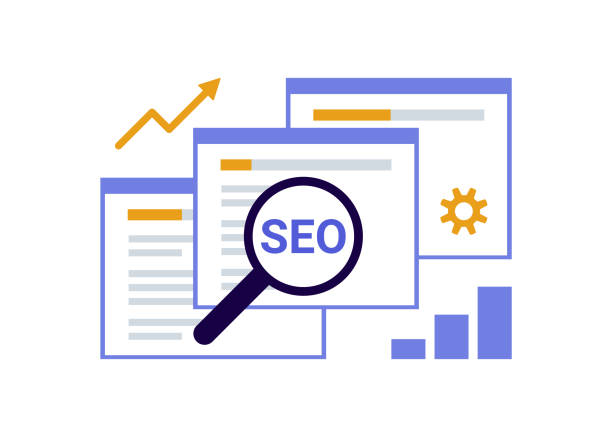What is SEO and why is it important for businesses?
What is SEO and why is it important for businesses?
SEO, or Search Engine Optimization (#SEO), is a set of techniques and strategies used to improve a website’s ranking in search engine results like Google, Bing, and Yahoo.
The main goal of SEO is to increase website visibility and attract organic (non-paid) traffic.
This is important because most internet users use search engines to find information, products, and services they need.
If a website doesn’t appear on the first pages of search results, it is unlikely to be seen by users and will miss many opportunities.
#SEO helps businesses to:
- Increase Website Traffic: By improving ranking in search results, the traffic to the website increases.
- Increase Sales and Revenue: More traffic means more sales opportunities.
- Increase Brand Awareness: Being in the top search results helps increase brand recognition.
- Reduce Marketing Costs: Organic traffic is free, which reduces marketing costs.
- Improve User Experience: Many SEO techniques focus on improving user experience, which leads to greater customer satisfaction.
In short, SEO is a long-term investment that can bring significant results for businesses.
With a proper SEO strategy, businesses can consistently attract organic traffic and achieve their business goals.
Did you know that a weak company website loses you many opportunities daily? Solve this problem forever with a professional company website design by Rasaweb!
✅ Create a powerful and reliable image of your brand
✅ Attract targeted new customers and increase sales
⚡ [Get a free website design consultation]
Introduction to key SEO concepts: Keywords, Link Building, and Content
Introduction to Key SEO Concepts: Keywords, Link Building, and Content
To better understand SEO, it’s necessary to become familiar with its three key concepts:
- Keywords: These are the words and phrases that users enter into search engines to find the information they need.
Choosing appropriate keywords relevant to your business is the first step in SEO.
There are various tools for finding suitable keywords, including Ahrefs Keyword Generator and Keyword Tool.
After finding keywords, you should strategically use them in your website content. - Link Building: The process of receiving links from other websites to your website.
Links are considered a vote of confidence from other websites to your website and show search engines that your website is credible and valuable.
There are different types of links, including internal links (links between different pages of your website) and external links (links from other websites). - Content: Your website’s content includes all the texts, images, videos, and other media that you publish on your website.
High-quality content relevant to keywords is one of the most important factors for success in SEO.
Your content should be attractive and helpful to users and answer their questions.
Also, your content should be updated regularly to remain fresh and relevant for search engines.
Click here to preview your posts with PRO themes ››
These three key concepts are interconnected, and to achieve high rankings in search results, you must pay attention to them simultaneously.
SEO is a continuous process that requires patience, but with effort and perseverance, you can achieve significant results.
On-Page SEO: Optimizing web pages for search engines
On-Page SEO: Optimizing Web Pages for Search Engines
On-Page SEO includes optimizing elements that are inside your website and directly controllable by you.
The goal of on-page SEO is to improve the ranking of your website’s pages in search results and increase their attractiveness to users.
Some of the most important on-page SEO factors include:
- Title Tag: The title tag is one of the most important on-page SEO factors.
The title tag should be short, attractive, and contain the main keyword of the page.
The title tag is displayed in search results and helps users understand what your page is about. - Meta Description: The meta description is a short summary of the page’s content.
The meta description is also displayed in search results and should be attractive and persuasive to encourage users to click on your link. - Headings: Using headings (H1) and subheadings (H2, H3, …) helps organize the page content and shows search engines what the main topics of the page are.
Headings should contain keywords and be logically structured. - Content: The content of the page should be high-quality, relevant, and useful for users.
Content should contain keywords, but keywords should not be used excessively (Keyword Stuffing).
Content should be updated regularly and meet the needs of users. - Images: Images should be optimized so that they do not slow down the page loading speed.
The image file names should contain keywords, and the Alt tag should be used to describe the images. - URL Structure: The URL structure of pages should be short, readable, and contain keywords.
For example, the URL “example.com/blog/seo-guide” is better than the URL “example.com/page?id=123”. - Internal Links: Internal links help search engines find the different pages of your website and understand how the pages are related to each other.
Use internal links to refer to related pages on your website.
Click here to preview your posts with PRO themes ››
By following these tips, you can improve the on-page SEO of your website pages and increase their ranking in search results.
| Element | Description | Importance |
|---|---|---|
| Title Tag | The title tag should be short, attractive, and contain the main keyword of the page. | Very High |
| Meta Description | The meta description is a short summary of the page’s content. | High |
| Headings | Using headings and subheadings helps organize the content. | Medium |
| Content | The content of the page should be high-quality, relevant, and useful. | Very High |
Off-Page SEO: Increasing website credibility and authority
Off-Page SEO: Increasing Website Credibility and Authority
Off-Page SEO includes activities that are done outside of your website and are intended to increase your website’s credibility and authority.
The main goal of off-page SEO is to obtain quality links from other websites.
These links show search engines that your website is credible and valuable, and for this reason, your ranking in search results improves.
Some of the most important off-page SEO factors include:
- Link Building: Receiving links from other websites to your website.
Links should be from relevant and high-quality websites. - Social Media Marketing: Being active on social networks and sharing your website’s content.
- Content Marketing: Creating and publishing high-quality and valuable content that attracts links and traffic.
- Branding: Creating a strong and credible brand that increases user and search engine trust.
- Public Relations: Building relationships with the media and receiving news coverage for your website.
Obtaining quality links from other websites is one of the most challenging yet important aspects of off-page SEO.
For this purpose, you can use various methods, including:
- Creating high-quality and valuable content: High-quality and valuable content naturally receives links.
- Participating in forums and communities: Participate in forums and communities related to your field and answer users’ questions.
- Connecting with bloggers and influencers: Connect with bloggers and influencers related to your field and ask them to link to your website.
- Participating in events and conferences: Participate in events and conferences related to your field and connect with other people active in this field.
SEO is a time-consuming process that requires patience, but with effort and perseverance, you can achieve significant results.
Did you know that your company’s website is the first point of contact for 75% of potential customers?
Your website is the face of your brand. With Rasaweb’s corporate website design services, create an online presence that earns customer trust.
✅ Create a professional and lasting image of your brand
✅ Attract target customers and increase online credibility
⚡ Get a free consultation from Rasaweb experts!
Keyword Research: Finding the best keywords to target
Keyword Research: Finding the Best Keywords to Target
Keyword Research is the process of finding words and phrases that users enter into search engines to find the information they need.
The goal of keyword research is to find the best keywords to target in your website’s content.
These keywords should be relevant to your business, have high search volume, and have less competition.
To perform keyword research, you can use various tools, including:
- Google Keyword Planner: A free Google tool that helps you find keywords related to your business and check their search volume.
- Ahrefs: A paid tool that offers more advanced features for keyword research, including checking keyword competition and finding long-tail keywords.
- SEMrush: Another paid tool that offers similar features to Ahrefs.
- Keyword Tool: A free and paid tool that helps you find keywords related to your business in different search engines (including Google, YouTube, Bing, and Amazon).
When performing keyword research, pay attention to the following points:
- Relevance: Keywords should be relevant to your business.
- Search Volume: Keywords should have high search volume.
- Competition: Keywords should have less competition.
- Long-Tail Keywords: Long-tail keywords are longer phrases that have lower search volume but also have less competition and can attract more targeted traffic to your website.
After finding the appropriate keywords, you should strategically use them in your website’s content.
This should be done naturally, and avoid using too many keywords (Keyword Stuffing).
SEO and choosing the right keywords is one of the most important aspects of SEO and can have a significant impact on your website’s ranking in search results.
Technical SEO: Optimizing website infrastructure for search engines
Technical SEO: Optimizing Website Infrastructure for Search Engines
Technical SEO refers to optimizing the technical aspects of your website for search engines.
This includes ensuring that search engines can easily find, crawl, and index your website.
Technical SEO is often overlooked, but it plays an important role in overall SEO success.
Some of the most important aspects of technical SEO include:
- Website Speed: Website loading speed is an important ranking factor.
Faster websites provide a better user experience and are more likely to be ranked by search engines.
To increase your website speed, you can use various techniques, including optimizing images, enabling Gzip compression, and using a Content Delivery Network (CDN). - Mobile-Friendliness: Given that most internet users use mobile devices to access the web, your website’s mobile-friendliness is very important.
Your website should automatically adapt to the screen size of different devices. - XML Sitemap: An XML sitemap is a file that contains a list of all the pages of your website.
An XML sitemap helps search engines easily find and crawl your website’s pages. - Robots.txt File: The Robots.txt file tells search engines which pages of your website should not be crawled.
Use the Robots.txt file to prevent crawling unnecessary or duplicate pages. - SSL Certificate: An SSL certificate is a security certificate that encrypts information between your website and users.
Using an SSL certificate increases your website’s security and user trust. - URL Structure: The URL structure of your website pages should be logical and readable.
Use keywords in the URL of pages and avoid using special and long characters.
By optimizing the technical aspects of your website, you can help search engines easily find, crawl, and index your website.
This can lead to improved website ranking in search results and increased organic traffic.
In fact, with #Technical SEO, you can increase your ranking.
User Experience (UX) and SEO: Creating a User-Friendly Website
User Experience (UX) and SEO: Creating a User-Friendly Website
User Experience (UX) refers to the feeling and experience that users have when using a website.
A good user experience makes users enjoy your website, easily find the information they need, and become loyal customers.
User experience and SEO are two related concepts.
Search engines are increasingly paying attention to user experience as a ranking factor.
Some of the important factors that affect user experience include:
- Website Speed: Faster websites provide a better user experience.
- Easy Navigation: Users should be able to easily navigate your website and find the information they need.
- Attractive and Modern Design: Your website’s design should be attractive and modern and match your brand.
- High-Quality Content: The content of your website should be high-quality, relevant, and useful for users.
- Mobile-Friendliness: Your website should be compatible with all mobile devices.
- Security: Your website should be secure and protect user information.
To improve your website’s user experience, you can use various methods, including:
- Performing Usability Testing: Ask users to use your website and provide feedback.
- Using Web Analytics Tools: Use web analytics tools like Google Analytics to review how users are using your website.
- Studying Web Design Trends and Best Practices: By studying web design trends and best practices, you can create a modern and user-friendly website.
By improving your website’s user experience, you can increase your website’s ranking in search results, attract more traffic, and create more loyal customers.
| User Experience Factor | Impact on SEO |
|---|---|
| Website Speed | Better ranking in Google, lower bounce rate |
| Easy Navigation | Increased time on site, reduced bounce rate |
| Mobile-Friendliness | Better ranking in Google, increased mobile traffic |
| High-Quality Content | Receiving more links, increased sharing on social networks |
Measuring and Analyzing SEO: Tracking Results and Improving Strategy
Measuring and Analyzing SEO: Tracking Results and Improving Strategy
SEO Measurement and Analysis is the process of tracking the results of SEO efforts and using this information to improve SEO strategy.
Without measurement and analysis, you can’t know if your SEO efforts are effective or not, and how you can improve them.
Some of the most important metrics to measure in SEO include:
- Keyword Ranking: Keyword ranking shows where your website ranks in search results for different keywords.
- Organic Traffic: Organic traffic refers to traffic that comes to your website through search engines.
- Bounce Rate: The bounce rate shows what percentage of users who enter your website leave it without visiting other pages of your website.
- Time on Site: Time on site shows how long users spend on your website on average.
- Conversion: Conversion refers to an action that you want users to take on your website, such as buying a product, subscribing to the newsletter, or filling out a form.
To measure and analyze SEO, you can use various tools, including:
- Google Analytics: A free Google tool that provides comprehensive information about your website traffic.
- Google Search Console: A free Google tool that provides information about how search engines see your website.
- Ahrefs: A paid tool that offers more advanced features for SEO measurement and analysis.
- SEMrush: Another paid tool that offers similar features to Ahrefs.
Using these tools, you can get accurate information about the performance of your website’s SEO and use this information to improve your SEO strategy.
Does your current online store design cause you to lose customers and sales?
Rasaweb, with modern and user-friendly online store designs, is your solution!
✅ Significant increase in conversion rate and sales
✅ Creating a strong brand and gaining customer trust
⚡ Get a free online store design consultation from Rasaweb!
Common SEO Mistakes and How to Avoid Them
Common SEO Mistakes and How to Avoid Them
SEO is a complex process, and making mistakes in this area can harm your website’s ranking.
In this section, we will address some common SEO mistakes and how to avoid them:
- Keyword Stuffing: Using too many keywords in your website’s content can harm your website’s ranking.
Instead of using too many keywords, try to create high-quality content related to your keywords. - Ignoring Mobile SEO: Given that most internet users use mobile devices to access the web, ignoring mobile SEO can be a big mistake.
Make sure your website is compatible with all mobile devices. - Low-Quality Link Building: Getting links from low-quality websites can harm your website’s ranking.
Try to get quality links from relevant and reputable websites. - Ignoring User Experience (UX): User experience is an important ranking factor.
Make sure your website is user-friendly and that users can easily find the information they need. - Not Measuring and Analyzing Results: Without measuring and analyzing results, you cannot know if your SEO efforts are effective or not.
Regularly measure and analyze your SEO results and use this information to improve your SEO strategy.
By avoiding these common mistakes, you can increase your chances of success in SEO and improve your website’s ranking in search results.
SEO is a continuous process.
The Future of SEO: New Changes and Trends
The Future of SEO: New Changes and Trends
SEO is a dynamic field and is constantly changing.
To succeed in SEO, you need to be aware of the new changes and trends.
Some of the most important SEO trends in the future include:
- Artificial Intelligence (AI): Artificial intelligence is changing how search engines work.
Search engines use artificial intelligence to better understand the meaning of keywords, content, and user behavior. - Voice Search: Voice search is on the rise.
To optimize your website for voice search, you should use long-tail keywords and conversational content. - Video Marketing: Video marketing is a great way to engage audiences and increase your website ranking.
Use video to educate, entertain, and inform your audience. - User Experience (UX): User experience will continue to be an important ranking factor.
Make sure your website is user-friendly and that users can easily find the information they need. - Mobile Optimization: Given that most internet users use mobile devices to access the web, mobile optimization will still be very important.
By keeping these trends in mind, you can keep your SEO strategy up to date and stay ahead of your competitors.
SEO and its future are changing.
Frequently Asked Questions
| Question | Answer |
|---|---|
| What is SEO? | SEO, or Search Engine Optimization, is a process to increase the quality and quantity of website traffic by improving the site’s ranking in the natural (organic) search results of search engines like Google. |
| What are the main types of SEO? | SEO is divided into three main categories: On-Page SEO, Off-Page SEO, and Technical SEO. |
| What does On-Page SEO include? | On-Page SEO includes optimizing elements within the website, such as keywords, Title Tag, Meta Description, content, URL structure, images, and internal links. |
| What is Off-Page SEO? | Off-Page SEO refers to activities outside the website that help improve its ranking, such as Backlink Building, Social Media Marketing, and Brand Mentions. |
| What is Technical SEO? | Technical SEO deals with optimizing the technical aspects of the website to help search engines crawl and index it better. This includes site speed, mobile-friendliness, site structure, sitemaps, and the Robots.txt file. |
| What role do Keywords play in SEO? | Keywords are phrases that users enter into search engines. Using the correct and targeted keywords related to the content and elements of the site helps search engines understand the topic of your page and display it to related searches. |
| What is a Backlink and why is it important? | A backlink, or inbound link, is a link from one website to another website. Backlinks act as a “vote of confidence” from other sites to search engines and play an important role in the credibility and increasing the site’s ranking, especially if they are from reputable sites. |
| How does high-quality content affect SEO? | High-quality, relevant, comprehensive, and unique content not only attracts and retains users, but also shows search engines that your page is valuable. This helps improve ranking, reduce bounce rate, and increase user time on site. |
| Why is site loading speed important for SEO? | Site loading speed is an important ranking factor for Google. Faster sites provide a better user experience, have a lower bounce rate, and are preferred by search engines. |
| Is SEO a one-time process? | No, SEO is a continuous and long-term process. Search engine algorithms are constantly changing, competition is increasing, and site content also needs to be updated. Therefore, SEO requires continuous monitoring, analysis, and optimization. |
And other services of Rasa Web Advertising Agency in the field of advertising
Smart Digital Branding: An effective tool for analyzing customer behavior with the help of Google Ads management.
Smart Custom Software: A professional solution for analyzing customer behavior with a focus on dedicated programming.
Smart Direct Marketing: Designed for businesses looking to increase sales by using real data.
Smart Sales Automation: A combination of creativity and technology to manage campaigns by designing an attractive user interface.
Smart Marketing Automation: A creative platform to improve sales growth with marketing automation.
And more than hundreds of other services in the field of internet advertising, advertising consulting and organizational solutions
Internet Advertising | Advertising Strategy | Advertorial
Resources
What is SEO and what is its use?
,What is SEO? A comprehensive and complete SEO guide for beginners
,What is SEO (Search Engine Optimization) and what is its use? SEO tutorial from scratch for beginners
,What is SEO? A comprehensive SEO guide in simple language [Update 2024]
? For a leap into the digital world and reaching great goals, Rasaweb Digital Marketing Agency is here to help you. If you are looking for professional services including personal website design and innovative marketing strategies, contact us to take your business to the top.
📍 Tehran, Mirdamad Street, next to the Central Bank, South Kazeroun Alley, Ramin Alley No. 6














